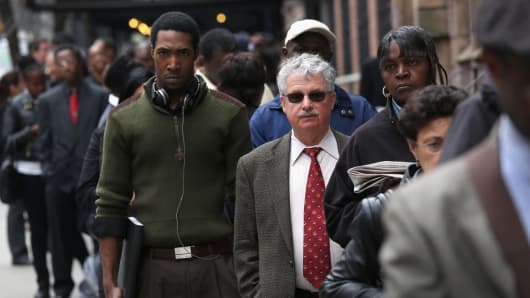(Read More: The Economy May Stink, but the Market Doesn't Care)
The stock market has surged about 140 percent since the March 2009 lows, but the economy has struggled.
Unemployment is still 7.5 percent, and gross domestic product grew just 2.5 percent in the first quarter.Roubini said many other nations are in the same predicament, with China in danger of a hard landing and Europe facing the question of whether it is in a triple-dip recession or "still in a double-dip recession and they never got out."
For the economist sometimes referred to as "Dr. Doom" the cause of the financial market-economy dichotomy is simple: "monetary easing" from global central banks.
(Read More: Why US Stocks Are Soaring While Economy Struggles)
"There is a gap between Wall Street and Main Street," he said. "The economy is not going great. Wall Street is going great."
Michael E. Novogratz, president of Fortress Investment Group, compared the Federal Reserve's strategy, also known as quantitative easing, to the trickle-down economics that Democrats decried in the 1980s under President Ronald Reagan.
"Now it's the exact opposite," with Republicans opposing QE, Novogratz said.
"All this policy is doing is making the wealthy people in this country wealthier," he added. "The gap between rich and poor has gotten wider over the years. Now we have monetary policy exacerbating that."
Many market and economic experts, including Roubini, have tied the Fed's policy directly to the stock market rally, and a time line tracing both does lend some credence.
(Read More: Fed Keeps Pedal to the Metal as Economy Wobbles)
But Austan Goolsbee, former chairman of President Barack Obama's council of economic advisors, said the Fed is doing exactly what it should. In fact, he said he believes that the rally is attributable more to improved corporate balance sheets and earnings.
"If you had said at any earlier time growth would be at 2 percent for any extended period, the unemployment rate would be at or about 8 percent for four straight years, and inflation would be well below the 2 percent target and perhaps dropping—every economist in the world would say you should have loosened monetary policy in that environment," Goolsbee said.
The problem has been finding strong economic growth within that easy monetary policy.
"Asset [prices] are going to go up—we're going to hope that it does trickle down," Novogratz said. "Part of it is getting used to this new regime and finding out if it's the America we all love."
—By CNBC's Jeff Cox. Follow Jeff on Twitter @JeffCoxCNBC.com.





